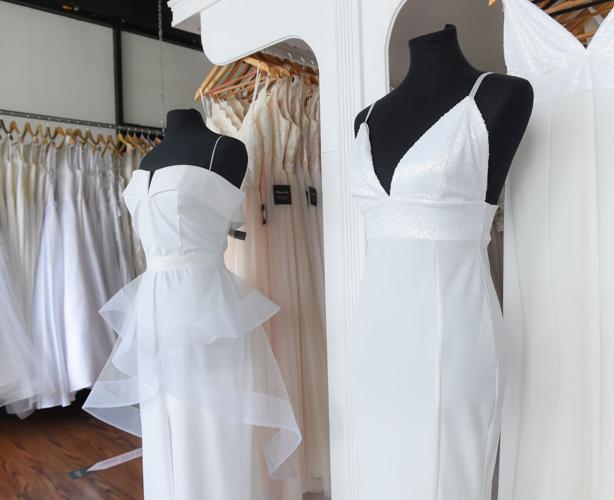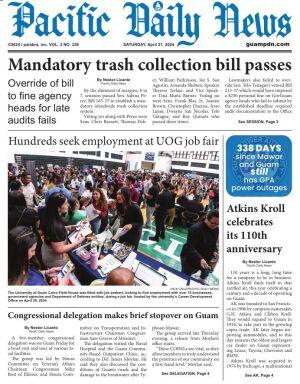After wedding plans collapsed in the pandemic, marriage ceremonies are back across the island. Wedding planners are working within the rules of the local government to carry out marriages during the pandemic.
The demand is so high, some wedding planners are finding themselves planning marriages within two weeks, sometimes hosting marriages back-to-back at chapels.
Because of COVID-19 restrictions, some brides and grooms are having guests attend virtually. Others have changed their weddings from a religious event to a small civil gathering.
“They try to Zoom whomever cannot attend,” said Jane Kwok, a freelance wedding planner on Guam. “The majority of people that attend are the parents and the younger generation, not the godparents or grandparents because they are old and try not to go to the public.”
As a wedding planner for the past 20 years, Kwok said she thought she had seen it all: typhoon seasons that destroyed venues days before a wedding or last-minute break-ups that ended year-long plans.
"But now, with the outbreak of the novel coronavirus pandemic, the wedding industry is facing a new kind of challenge unlike any other," Kwok said.
Most of the weddings last year were rescheduled for the spring or later, Kwok said. She said clients are protecting deposits from wedding packages that would have otherwise been non-refundable, a potential loss of $6,000 for a $30,000 agreement.
With a rushed event, wedding planners have to coordinate logistics, decorations, and meet couples virtually, after they finish work.
“A wedding used to be planned six months to a year,” said David Asombrado Jr., the lead stylist at Blush Bridal Boutique & Blu. “We have girls coming in two to three weeks trying to get married.”
Guam culture expects extended family when it comes to weddings. Before the pandemic, some venue spaces accommodated hundreds of people. In recent ceremonies, wedding experts describe them as small and personal.
Last fall, Kwok worked with couples whose weddings were limited to a maximum of 30 people, including staff, she said.
Shorter, cheaper
Weddings before the pandemic meant Kwok and her team handled the hair and makeup service — a two-hour feat — for the bride. That tradition is out, in light of the coronavirus.
“The bride has to find her own friends or do it on herself,” Kwok said.
She said a wedding ceremony now typically lasts 20 minutes. Adding the procession and photos, Kwok estimates a wedding event totals 90 minutes.
One bonus — the fees charges have diminished significantly, Kwok said. Hotels used to charge banquets per person and with feasts canceled that means a lower cost.
“If you have more tables for the banquet, you would need flower decorations,” Kwok said. “We have customers that book bento boxes as a giveaway to the guests after the ceremonies so they can enjoy as food at home."
Now, the florist hangs up fewer flowers, and the hotels cancel room accommodations for families from overseas.
No tourist weddings
At Watabe Wedding Guam, more than 1,000 couples postponed or canceled their weddings, according to Kaori Kudo, the planning and promotion department’s assistant manager.
With tourism on a standstill, scheduled weddings for overseas travelers are paused, but Watabe will resume local weddings this month.
“We receive many inquiries from local customers, and we have received many reservations from overseas tourists for weddings,” Kudo said.
The business requires guests to check temperatures and sanitize hands when they arrive at a venue. Then, staff instructs visitors on the social distance policies during the wedding ceremony and enforces the wearing of masks.
Civil marriages
In the near future, with tourist marriages remaining sparse, the wedding market is banking on ceremonies for local residents.
“A lot of them have gone from deciding to get married at a church to getting married civilly, or if they have a large civil wedding, it’s gonna be smaller, so the dresses that were originally planned to be larger or more extravagant dresses have become unrealistic,” Asombrado said.
On Guam, the wedding season is busiest from May to August, Asombrado said.
“Because of the lockdown, the weddings have been pushed through December. Brides seeing more roadblocks to obtain a marriage license have pushed their weddings even further,” he added.
Last year, wedding concerns were about guest invitations or elaborate efforts. Now budgets have changed.
“Some of the brides have been unable to make payments because some of them, unfortunately, have lost their jobs,” Asombrado said.
Asombrado, despite his sympathy, said he's contractually bound to the terms of a dress sold or reserved by a bride. While full refunds aren't common, Blush Bridal has offered free or reduced storage fees and extended payment plans.
Even if women walk into the bridal shop with smaller budgets, Asombrado said the volume of girls getting married has stayed the same.
“In fact, more people are getting married civilly,” he said. “The restrictions are kind of allowing them to afford a wedding plan because they don’t have to compensate or pay for everybody."
Reach reporter Anne Wen at awen@guampdn.com.
This article originally appeared on Pacific Daily News: Coronavirus forces couples to postpone, then rush, weddings









(0) comments
Welcome to the discussion.
Log In
Keep it Clean. Please avoid obscene, vulgar, lewd, racist or sexually-oriented language.
PLEASE TURN OFF YOUR CAPS LOCK.
Don't Threaten. Threats of harming another person will not be tolerated.
Be Truthful. Don't knowingly lie about anyone or anything.
Be Nice. No racism, sexism or any sort of -ism that is degrading to another person.
Be Proactive. Use the 'Report' link on each comment to let us know of abusive posts.
Share with Us. We'd love to hear eyewitness accounts, the history behind an article.